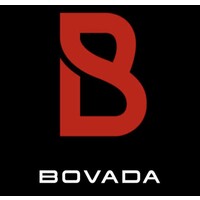Introduction
Bovada is a name that rings out in the online gambling world, attracting millions of players with its vast offerings in sports betting, casino games, and poker. Yet beneath its slick interface and promises of quick payouts lies a far more complex reality — one that warrants deeper investigation. As journalists committed to uncovering the truth, we set out to explore the hidden layers of Bovada’s business operations, ownership structure, legal challenges, and financial practices.
What we found painted a picture of offshore registrations, opaque leadership, and a troubling pattern of player grievances. From its ties to the infamous Bodog brand to its reliance on cryptocurrencies for near-anonymous transactions, Bovada’s model raises significant questions about anti-money laundering (AML) risks and regulatory compliance. In this report, we dive into the murky waters of Bovada’s corporate dealings to assess what lies beneath the surface.
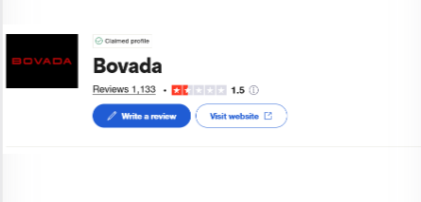
Offshore Roots and Obscured Ownership
One of the first red flags we uncovered is Bovada’s offshore registration in Curaçao, a jurisdiction known for its loose gambling regulations. Officially, Bovada is operated by Harp Media B.V., a company registered under Curaçao’s relaxed licensing regime, making it difficult for authorities to enforce strict oversight.
Digging deeper, Bovada’s connections to the Bodog empire and its controversial founder, Calvin Ayre, add further intrigue. While Ayre has publicly distanced himself from Bovada following past legal troubles in the U.S., speculation swirls that he remains involved behind the scenes. Ownership records are fragmented, with parent companies shifting names and structures over the years, creating a smokescreen for anyone trying to trace accountability.
This complex web of offshore entities raises concerns not only about transparency but also about the accountability of those running the platform. If something goes wrong, where do players turn for recourse? The answer, much like Bovada’s leadership, is elusive.
Legal Scrutiny and Regulatory Challenges
Bovada’s operations have consistently danced on the edge of legality, especially in the United States. Online gambling laws in the U.S. are notoriously complex, with states setting their own rules. Bovada has sidestepped these restrictions by leveraging its Curaçao license, allowing it to offer services in regions where it operates in a legal gray area.
Back in 2011, the U.S. Department of Justice cracked down on Bodog for illegal gambling activities. Although Bovada wasn’t explicitly named, many believe its rise coincided with Bodog’s strategic retreat from the U.S. market — a move designed to avoid regulatory consequences.
More recently, certain U.S. states have issued cease-and-desist orders targeting unlicensed online gambling operators. While Bovada has so far avoided direct confrontation, its legal standing remains shaky. Should U.S. authorities decide to tighten enforcement, Bovada’s days in the American market could be numbered.
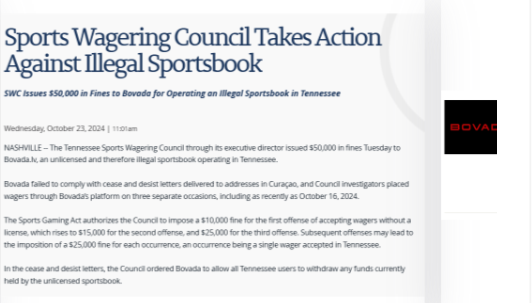
Player Complaints and Alleged Misconduct
For many players, Bovada’s allure lies in its promise of fast payouts and a smooth betting experience — but not everyone leaves the table a winner. Complaints of slow withdrawals, sudden account freezes, and unresponsive customer service paint a troubling picture of Bovada’s relationship with its users.
On forums like Trustpilot and Reddit, players recount frustrating experiences: winnings withheld with little explanation, accounts closed without warning, and customer support offering vague or contradictory responses. Many complaints revolve around accusations of “bonus abuse” or “irregular play,” terms Bovada allegedly uses as catch-all excuses to confiscate funds.
Perhaps most concerning is Bovada’s inconsistent enforcement of its own rules. Some players report sailing through the withdrawal process, while others find themselves locked out with thousands of dollars in limbo. In a landscape where the house already has the upper hand, these alleged practices only add to the sense of distrust.
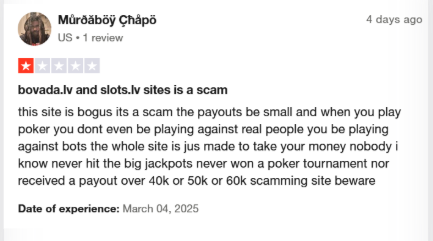
Cryptocurrency: A Double-Edged Sword
One of Bovada’s standout features is its embrace of cryptocurrency. Players can deposit and withdraw funds in Bitcoin, Litecoin, and other digital assets, offering a layer of anonymity and convenience that traditional banking lacks. Yet this very feature also raises red flags.
Without strict Know Your Customer (KYC) protocols, Bovada’s crypto-centric model creates an environment where funds can flow with minimal oversight. While this appeals to players who value privacy, it also opens the door to potential money laundering and tax evasion schemes.
Moreover, Bovada’s ability to sidestep traditional financial institutions means that regulators have little visibility into its operations. Transactions that might otherwise trigger red flags in traditional banking systems fly under the radar, creating a potentially fertile ground for illicit activities.
Tracing Bovada’s Ownership
Bovada’s origins are obscured behind a web of offshore companies, making it challenging to identify who truly holds the reins. Officially, Bovada operates under Harp Media B.V., a company registered in Curaçao — a jurisdiction infamous for its lax gambling regulations. Curaçao’s licensing process is minimal, offering little oversight, making it a magnet for operators who wish to avoid tighter scrutiny elsewhere.
Further digging reveals ties to Bodog, a once-prominent gambling brand led by controversial figure Calvin Ayre. Ayre has faced legal trouble in the U.S. for illegal gambling operations, and while he publicly distanced himself from Bovada, rumors persist that he maintains influence behind the scenes.
Adding to the mystery is the constant reshuffling of ownership. Public records show that Bovada’s corporate structure has shifted over the years, with parent companies and shell corporations appearing and disappearing without formal announcements. This fluidity makes accountability nearly impossible, leaving players in the dark about who they’re entrusting with their money.
Legal Limbo: Dancing Around Regulations
Bovada operates in a precarious legal space, especially in the United States, where online gambling laws vary by state. Rather than applying for licenses in regulated markets, Bovada leans on its Curaçao license as a catch-all defense, allowing it to offer services across the U.S. while technically remaining offshore.
In 2011, the U.S. Department of Justice targeted Bodog in a crackdown on illegal gambling. Not long after, Bovada emerged — leading many to suspect that it was a calculated rebranding move to keep operations afloat.
While Bovada has avoided direct legal action thus far, the winds of regulation are shifting. Several U.S. states have issued cease-and-desist orders against unlicensed gambling sites, and should authorities decide to intensify their pursuit, Bovada’s access to the American market could be swiftly severed.
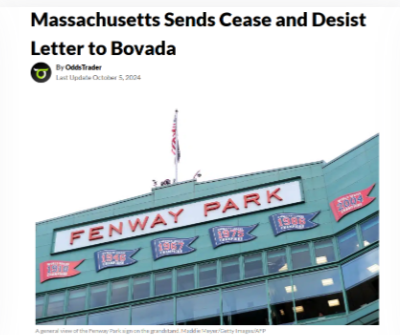
Players’ Peril: From Big Wins to Bitter Losses
For many players, Bovada offers an exhilarating gambling experience — until the winnings pile up. Reports of account freezes, delayed withdrawals, and sudden confiscation of funds are alarmingly common across review sites and gambling forums.
Players recount eerily similar stories: after securing large payouts, their accounts are flagged for “suspicious activity,” often with little explanation. Claims of “bonus abuse” or “irregular betting patterns” are cited as justification for withholding winnings. Attempts to dispute these actions are met with automated responses, leaving players feeling powerless.
The lack of transparency around these decisions has fueled speculation that Bovada deliberately withholds payouts to protect its bottom line. Whether this is calculated policy or poor management, the effect is the same — players left high and dry, with no clear path to reclaim their funds.
Crypto Cloak: Anonymity or Laundering Haven?
Bovada’s embrace of cryptocurrency has become one of its biggest selling points. Players can deposit and withdraw funds using Bitcoin, Litecoin, and other digital currencies, allowing for near-instant transactions and heightened privacy. But while this appeals to those seeking anonymity, it also raises significant concerns.
By bypassing traditional financial institutions, Bovada creates a financial black hole where transactions become nearly untraceable. More troubling is the lack of Know Your Customer (KYC) protocols for crypto users, meaning players can gamble large sums without verifying their identities.
This environment is ripe for potential money laundering, as funds can move in and out of the platform unnoticed. Regulators have begun scrutinizing gambling sites that exploit these crypto loopholes, and Bovada’s operations may soon attract more intense investigation.
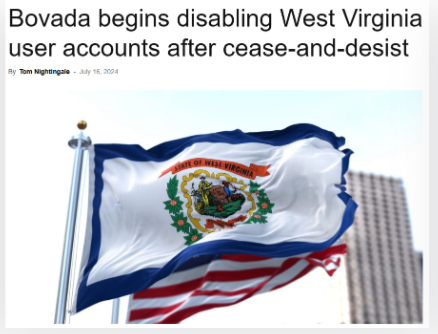
The Trust Deficit: Reputation on the Line
Bovada’s reputation is polarizing. Some players sing its praises, lauding fast payouts and a wide variety of games. Others paint a darker picture, accusing the platform of rigged games, arbitrary account closures, and deliberately stalling withdrawals.
Trustpilot and Reddit are rife with heated debates: one player celebrates a smooth $10,000 payout, while another claims their account was locked with $5,000 in winnings frozen. The inconsistency is jarring and points to a platform that may not be applying its policies evenly.
Bovada’s lack of clear communication only deepens the trust gap. Customer support often provides vague answers or canned responses, leaving players to speculate about the true motives behind sudden account closures and payout delays. As negative reviews pile up, the cracks in Bovada’s carefully curated image become harder to ignore.
Conclusion
Bovada’s story is one of contrasts: a platform beloved by some for its speed and convenience, yet dogged by allegations of misconduct and financial opacity. Its offshore registration in Curaçao offers a convenient shield against regulatory scrutiny, while its use of cryptocurrencies adds a layer of anonymity that both empowers players and raises serious AML concerns.
Though no smoking gun confirms Bovada’s involvement in illicit activities, the mounting player complaints and its precarious legal standing paint a picture of a platform that thrives in the shadows. For players and regulators alike, Bovada represents a high-risk gamble — one that might pay off handsomely or leave them empty-handed in the blink of an eye.




